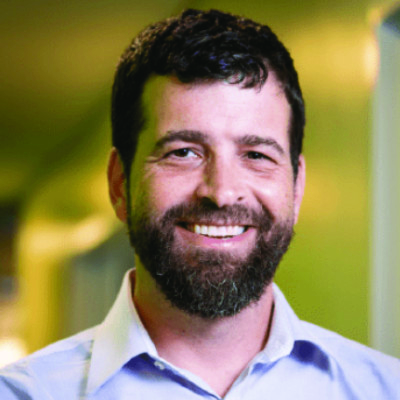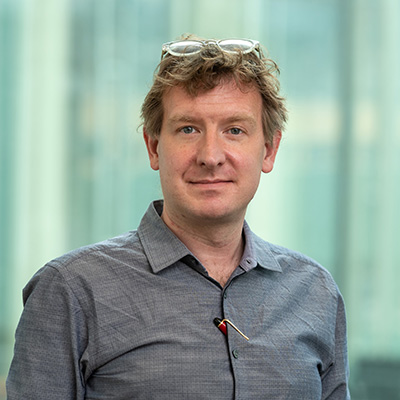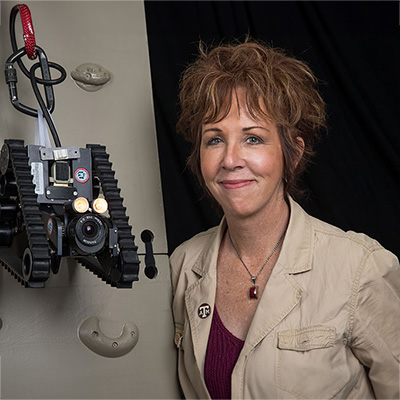Samuel D. Conte Distinguished Lecture Series
Samuel D. Conte (1917-2002) founded the Department of Computer Science at Purdue University in 1962. His vision and active involvement nationally and internationally played a vital role in defining the discipline of computer science worldwide.
Each year, the Department of Computer Science faculty identify computer scientists who are recognized as leaders in the field and whose ideas and research command the attention of the students and faculty. A select group of individuals are then invited to be a part of the annual Samuel D. Conte Distinguished Lecture Series on Computer Science.
In 1993, the Samuel D. Conte Endowment was established to honor Professor Emeritus Conte and his devotion to excellence in teaching and research in computer science. The Samuel D. Conte Lecture Series, sponsored by the endowment, serves as a permanent testimonial of his contributions to the Department of Computer Science, Purdue University, and the computing field.

Professor Sam Madden
Monday, September 8, 2025
2:30 pm
DSAI 1069
Title
How I Learned to Start Querying and Love AI
Abstract
Over the past five decades, the relational database model has proven to be a scaleable and adaptable model for querying a variety of structured data, with use cases in analytics, transactions, graphs, streaming and more. However, most of the world’s data is unstructured. Thus, despite their success, the reality is that the vast majority of the world’s data has remained beyond the reach of relational systems. The rise of deep learning and generative AI offers an opportunity to change this. These models provide a stunning capability to extract semantic understanding from almost any type of document, including text, images, and video which can extend the reach of databases to all the world's data. In this talk I explore how these new technologies will transform the way we build database management software, creating new systems that can ingest, store, process, and query all data. Building such systems presents many opportunities and challenges. In this talk I focus on three: scalability, correctness, and reliability, and argue that the declarative programming paradigm that has served relational systems so well offers a path forward in the new world of AI data systems as well. To illustrate this, I describe several examples of such declarative AI systems we have built in document and video processing, and provide a set of research challenges and opportunities to guide research in this exciting area going forward.
Bio
Samuel Madden is the College of Computing Distinguished Professor of Computing at MIT. His research interests include databases, distributed computing, and networking. Research projects include learned database systems, the C-Store column-oriented database system, and the CarTel mobile sensor network system. Madden heads the Data Systems Group at MIT and the Data Science and AI Lab (DSAIL), an industry supported collaboration focused on developing systems that use AI and machine learning. Madden received his Ph.D. from the University of California at Berkeley in 2003 where he worked on the TinyDB system for data collection from sensor networks. Madden was named one of Technology Review's Top 35 Under 35 in 2005 and an ACM Fellow in 2020, and is the recipient of several awards, including an NSF CAREER award, a Sloan Foundation Fellowship, the ACM SIGMOD Edgar F. Codd Innovations Award, and "test of time" awards from VLDB, SIGMOD, SIGMOBILE, and SenSys.

Professor Carl Kingsford
Thursday, April 25, 2024
10:30 am
LWSN 3102AB
(In-person only) Refreshments will be served.
Title
Automatically configuring bioinformatics tools in genomics and pan-genomics
Abstract
Measurements from genomic sequencing experiments (such as RNA-seq and Hi-C) must be transformed to be useful for revealing biological insights. This requires using software that is often highly parameterized and complex, leading to time-consuming and error-prone manual decisions about computational analysis parameters. In this talk, I will present two efforts to automate the analysis decisions that must be made when processing sequencing data.
In the first part, I will present a method for selecting an appropriate reference genome from a pan-genome for the analysis of genomic 3D structure measurements (Hi-C experiments). This is particularly important when studying samples with large-scale genomic variants (e.g. cancer samples). Our approach combines pan-genomic data structures with algorithms to infer optimal sample-specific reference genomes. I will show that this leads to better identification of topologically associating domains, an important element of genomic 3D structure.
In the second part, I will present a method for automatically learning parameters for blackbox analysis steps in bioinformatics pipelines. I will describe a framework that integrates Bayesian optimization and contrastive learning to train a predictor for optimal, sample-specific, parameters for bioinformatics analysis programs. Using the example of transcript assembly, I will show that the framework often leads to significant gains in assembly accuracy.
These efforts enable more accurate, more reproducible, lower-cost computational workflows to extract biological insight from large-scale data sets.
Joint work with Yihang Shen, Zhiwen Yan, Yutong Qiu, Lingge Yu, and Tianyu Zhang.
Bio
Carl Kingsford is the Herbert A. Simon Professor of Computer Science in the Ray and Stephanie Lane Computational Biology Department at Carnegie Mellon University. His research focuses on developing new computational methods for analysis of large biological data sets, especially genomic and transcriptomic data. He is the Director of CMU's Center for Machine Learning and Health, Co-Director of CMU’s Ph.D. program in computational biology, and Co-Founder of Ocean Genomics, Inc. He earned a Ph.D. in Computer Science from Princeton University in 2005 and was named a Fellow of the ISCB in 2024.

Professor Robin Murphy
Thursday, March 28, 2024
2:30pm
LWSN 3102 AB (In-person only)
Reception to follow in LWSN Commons.
Title:
Robots (and Research) to the Rescue
Abstract:
Ground, aerial, and marine robots are increasingly used by responders to save lives, mitigate ongoing threats, and accelerate economic recovery. The recent Surfside condo collapse and Hurricane Ian are two examples of the extreme environments that robots, and their operators, must function in. Clearly, rescue robots have great societal benefit; however our work at these two disasters illustrate why disaster robotics is important to robotics research in general. One reason is that research in the field at a disaster informs the virtuous research cycle, guiding both fundamental and convergent research. The use of robots at a disaster provides a “canary in the coal mine” indication of gaps in hardware, software, and human-robot interaction that might take years to discover through hypothesis-driven laboratory testing. The use of drones at the Surfside collapse has led to fundamental research in reconstructing voids using photogrammetry. Hurricane Ian showed that drone pilots by the end of the second day of the response were showing fatigue and cognitive deficits equivalent to being legally drunk in most states. Surprisingly, the fatigue did not lead to aviation errors, possibly because of the robustness and automation of the drones being used, but squads made significant errors in collecting the imagery needed by incident command. Hurricane Ian has produced advances in computer vision and machine learning, including new schemas for coding, identifying alignment errors, and producing a massive labeled open-source dataset. A second reason why disaster robotics is valuable is that it, by necessity, is pioneering domain-inspired, interdisciplinary synthesis, which in turns calls for new pedagogical approaches for educating the next generation of scientists.
Bio:
Robin R. Murphy, Ph.D. (’92) and M.S. (‘89) in computer science and B.M.E. (‘80) from the Georgia Institute of Technology, is the Raytheon Professor of Computer Science and Engineering at Texas A&M University and a director of the Center for Robot-Assisted Search and Rescue. Her research focuses on artificial intelligence, robotics, and human-robot interaction for emergency management. She is an AAAS, ACM, and IEEE Fellow, a TED speaker, and author of over 400 papers and four books including the award-winning Disaster Robotics which captures much of her research deploying ground, aerial, and marine robots to over 30 disasters in five countries including the 9/11 World Trade Center, Fukushima, Hurricane Harvey, and the Surfside collapse. Her contributions to robotics have been recognized with the ACM Eugene L. Lawler Award for Humanitarian Contributions and a US Air Force Exemplary Civilian Service Award medal. Dr. Murphy has served on numerous professional and government boards, including the Defense Science Board and National Science Foundation, as well as the AI for the Benefit of Humanity prize committee.